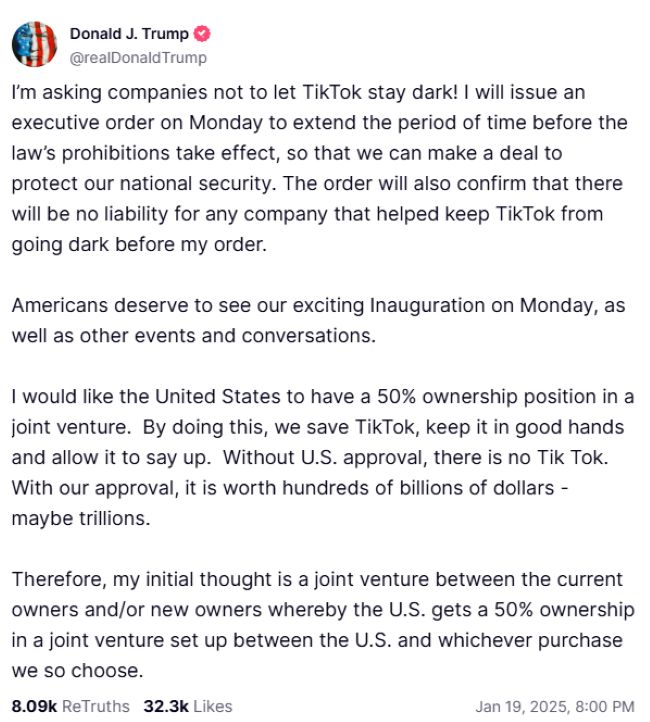On Sunday, President-elect Donald Trump announced plans to delay the impending ban on TikTok. He intends to issue an executive order extending the deadline and allowing more time to negotiate a deal.
Trump’s announcement followed the app’s darkening across the United States. A law banning TikTok for national security reasons took effect when its Chinese parent company, ByteDance, failed to meet the deadline for selling its U.S. operations to non-Chinese entities.
Although the law includes a provision for a 90-day delay if progress towards a deal is evident, ByteDance has rejected any sale. The outgoing Biden administration has deferred the issue to Trump, who assumes office on Monday, stating it will not enforce the ban.
Trump plans to use the extension to facilitate a deal that ensures national security protections. On his Truth Social platform, he stated that he aims for the United States to acquire a 50% ownership stake in a joint venture with TikTok. He believes this move could significantly increase the app’s value.

Trump also highlighted TikTok’s broad appeal—from teens to grandparents—and its role in making viral celebrities, despite concerns over disinformation and the implications of its Chinese ownership for national security.
In the wake of the ban’s enforcement, alternative platforms like Xiaohongshu (“Little Red Book”) have surged in popularity in the U.S., with many TikTok users seeking new platforms.
On the legal front, the U.S. Supreme Court recently upheld the legislation banning TikTok, pending any potential sale. Despite his previous support for a TikTok ban, Trump has recognized the platform’s ability to connect him with younger voters.
Read: TikTok Goes Dark in the US: What You Need to Know
The feasibility of Trump’s plan to lift the ban hinges on whether ByteDance agrees to sell, which remains uncertain given the strict legislative framework designed to limit presidential interference, as Adam Kovacevich, CEO of the industry trade group Chamber of Progress, notes.
Meanwhile, TikTok’s potential disappearance from the U.S. market has sparked global reactions, from government endorsements of the ban to public expressions of disappointment, evidenced by American tennis star Coco Gauff’s lament over the app’s loss at the Australian Open.
To salvage its U.S. operations, TikTok received a last-minute merger proposal from Perplexity AI, valued at around $50 billion. Frank McCourt, former owner of the Los Angeles Dodgers, has also expressed interest in purchasing TikTok’s U.S. activities, reflecting the intense interest and high stakes involved in the app’s future in America.






